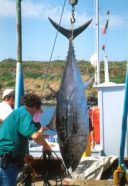Big fish in troubled waters
Overfishing cuts number of large predator fish in the ocean
You may have heard the popular saying “there are always more fish in the sea.” But as a number of new studies show, the truth of that statement depends on the kind of fish. Fish populations are changing, and not necessarily for the better.
Consider the case of big, predatory fish. These giants, like sharks and cod, devour other, smaller fish. Big fish are an important part of the marine ecosystem — which includes the ocean and all the things living in it — because they keep down the numbers of smaller fish. Without fish that eat other fish, populations of smaller swimmers could swell. More of these smaller fish would devour more plants, leaving less vegetation for other organisms — or for future fish.
As fierce and ferocious as predators can be, they’re no match for fishing technology. Many people love to eat predatory fish like sharks, cod and tuna. According to two new, large studies, these giant predators are becoming scarce. One study shows how the populations are decreasing; the other shows how fishing hauls, or the amount of fish caught, have changed. Together, the studies suggest that overfishing threatens the creatures near the top of the marine food chain.
In one study, Villy Christensen and his colleagues looked at 200 past studies of marine life to learn how fish populations have changed over time. Christensen is a fisheries expert at the University of British Columbia in Vancouver. The oldest studies his team looked at dated to 1880; the most recent were published in 2007. In these 200 studies, researchers counted and described all the different types of life in small oceanic ecosystems.

Christensen presented the team’s findings in February at the 2011 meeting of the American Association for the Advancement of Science in Washington, D.C. He reported that between 1910 and 1970, the numbers of big predators decreased slowly. In 1970, their populations really started to drop. Around that time, fishing ships began using new tools that led to catching more fish. The numbers have been falling quickly ever since.
Now, the number of these big fish in the ocean is very low. Christensen reported that today there is only about one-third as many of the large, fish-eating fish as there was in 1910. That means for every three you might have found in 1910, now you would only find one. Christensen said the future looks increasingly dismal for these giants.
“We see no indication that things are improving,” Christensen told the audience. “It’s a pretty bleak situation.”
While Christensen looked at the problem from the perspective of the fish, Reg Watson approached it from the perspective of the fishermen. Watson, a biologist also at the University of British Columbia, studied the increase in fishing in recent decades. Like Christensen, Watson reported his findings at the AAAS meeting.
In the middle of the 20th century, Watson reported, fishing boats didn’t venture far from home — and most fish were caught near the shore. That wasn’t true in the 1980s. By then, he said, fishing had moved farther from shore, into the open oceans, and it was helped by the development of new tools and technologies. These advances helped a lot: In the 1990s, fisherman hauled in five times as much fish, by weight, as they had in the middle of the century.
But since the 1990s, something has changed. Despite new technologies and more effort, fishing operations have not continued to boost their hauls. If there are fewer fish in the sea, fishing companies may have a hard time keeping up with the demand for fresh fish.
The studies by Watson and Christensen don’t paint a promising picture for sea predators. These scientists studied historical data to understand the present, and this research is needed to forecast the future of fish and fishing. And the forecast doesn’t look good: Large predator fish are becoming harder to find — and there may not be more in the sea for long.
POWER WORDS (Adapted from the New Oxford American Dictionary)
predator An animal that naturally preys on other animals.
food chain A group of organisms in which each one depends on the next as a source of food.
ecosystem A community of organisms that interact with each other and with their physical environment. The ocean ecosystem includes all the plants and animals that live in the sea.
organism An individual plant, animal or other life-form.







